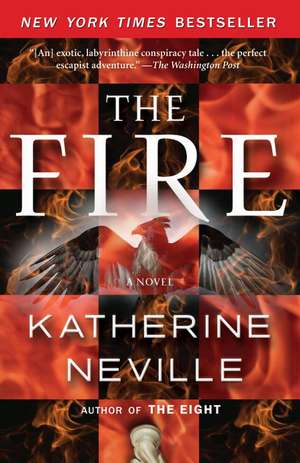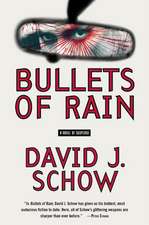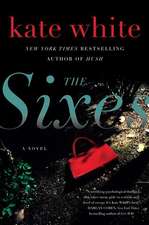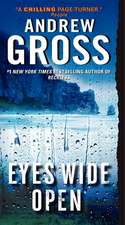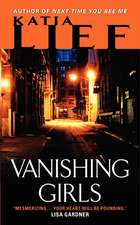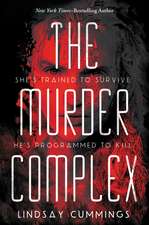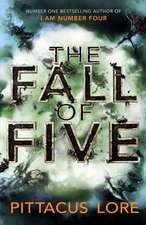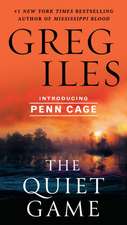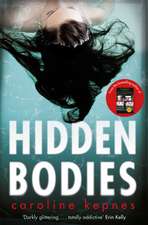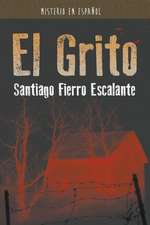The Fire
Autor Katherine Nevilleen Limba Engleză Paperback – 31 iul 2009
1822, Albania: Haidee, the young daughter of a powerful Ottoman ruler, embarks on a dangerous mission to smuggle a valuable relic out of Albania and deliver it into the hands of the one man who might be able to save it. Haidee’s journey brings forth chilling revelations that burn through history to the present day.
| Toate formatele și edițiile | Preț | Express |
|---|---|---|
| Paperback (2) | 107.82 lei 22-36 zile | +14.78 lei 5-11 zile |
| HarperCollins Publishers – 25 iun 2009 | 107.82 lei 22-36 zile | +14.78 lei 5-11 zile |
| BALLANTINE BOOKS – 31 iul 2009 | 116.47 lei 22-36 zile |
Preț: 116.47 lei
Nou
Puncte Express: 175
Preț estimativ în valută:
22.29€ • 24.22$ • 18.74£
22.29€ • 24.22$ • 18.74£
Carte disponibilă
Livrare economică 31 martie-14 aprilie
Preluare comenzi: 021 569.72.76
Specificații
ISBN-13: 9780345500687
ISBN-10: 0345500687
Pagini: 451
Dimensiuni: 134 x 208 x 25 mm
Greutate: 0.34 kg
Editura: BALLANTINE BOOKS
ISBN-10: 0345500687
Pagini: 451
Dimensiuni: 134 x 208 x 25 mm
Greutate: 0.34 kg
Editura: BALLANTINE BOOKS
Notă biografică
Katherine Neville is the author of The Eight, The Magic Circle (a USA Today bestseller), and A Calculated Risk (a New York Times Notable Book). The Eight has been translated into more than thirty languages. In a national poll in Spain by the noted journal El País, The Eight was voted one of the top ten books of all time. Neville lives in Virginia and Washington, D.C.
Extras
THE BLACK LAND
Wyrd oft nereth unfaegne eorl, ponne his ellen deah.
(Unless he is already doomed, fortune is apt to favor the man who keeps his nerve.)
–Beowulf
Mesa Verde, Colorado Spring 2003
BEFORE I’D EVEN REACHED THE HOUSE, I KNEW SOMETHING was wrong. Very wrong. Even though on the surface, it all seemed picture-perfect.
The steep, sweeping curve of drive was blanketed deep in snow and lined with stately rows of towering Colorado blue spruce. Their snow-covered branches sparkled like rose quartz in the early morning light. Atop the hill, where the driveway flattened and spread out for parking, I pulled up my rented Land Rover in front of the lodge.
A lazy curl of blue-gray smoke rose from the moss rock chimney that formed the center of the building. The rich scent of pine smoke pervaded the air, which meant that–although I might not be warmly welcomed after all this time–at least I was expected.
To confirm this, I saw that my mother’s truck and jeep were both sitting side-by-side in the former horse stable at the edge of the parking area. I did find it odd, though, that the drive had not yet been plowed and there were no tracks. If I were expected, wouldn’t someone have cleared a path?
Now that I was here at last, in the only place I’d ever called home, you would think I could finally relax. But I couldn’t shake the sense that something was wrong.
Our family lodge had been built at about this same period in the prior century, by neighboring tribes, for my great-great-grandmother, a pioneering mountain lass. Constructed of hand-hewn rock and massive tree trunks chinked together, it was a huge log cabin that was shaped like an octagon–patterned after a hogan or sweat lodge–with many-paned windows facing in each cardinal direction, like a vast, architectural compass rose.
Each female descendant had lived here at one time or another, including my mother and me. . . . So what was wrong with me? Why couldn’t I ever come here without this sense of impending doom? I knew why, of course. And so did my mother. It was the thing we never spoke about. That’s why–when I had finally left home for good–my mother understood. She’d never insisted, like other mothers, that I come back for familial visits.
That is, not until today.
But then, my presence today hadn’t exactly been by invitation–it was more of a summons, a cryptic message that Mother had left on my home phone back in Washington D.C., when she knew very well I’d be off at work.
She was inviting me, she said, to her birthday party.
And that, of course, was a big part of the problem.
You see, my mother didn’t have birthdays. She’d never had birthdays.
I don’t mean she was concerned about her youth or appearance or wished to lie about her age–in fact, she looked more youthful each year.
But the strange truth was, she didn’t want anyone outside of our family even to know when her birthday was.
This secrecy, combined with a few other idiosyncracies–like the fact that she’d been in hermetic retreat up on top of this mountain for the past ten years, ever since . . . the thing we never spoke about–all went far to explain why there were those who may have perceived my mother, Catherine Velis, as a pretty eccentric duck.
The other part of my current problem was that I hadn’t been able to contact my mother for an explanation of her sudden revelation. She’d answered neither her phone nor the messages I’d left for her, here at the lodge. The alternate number she’d given me was clearly not right–it was missing some final digits.
With my first true inkling that something was really wrong, I’d taken a few days off work, bought a ticket, caught the last flight into Cortez, Colorado, in a blizzard, and rented the last four-wheel-drive vehicle in the airport lot.
Now I left the engine running as I sat here for a moment, letting my eyes graze over the breathtaking panoramic view. I hadn’t been home in more than four years. And each time I saw it afresh, it smacked the wind out of me.
I got out of the Rover in knee-deep snow and let the engine run.
From here on the mountaintop, fourteen thousand feet atop the Colorado Plateau, I could see the vast, billowing sea of three-mile-high mountain peaks, licked by the rosy morning light. On a clear day like this, I could see all the way to Mount Hesperus–which the Diné call Dibé Nitsaa: Black Mountain. One of the four sacred mountains created by First Man and First Woman.
Together with Sisnaajinii, white mountain (Mt. Blanca) in the east; Tsoodzil, blue mountain (Mt. Taylor) in the south, and Dook’o’osliid, yellow mountain (San Francisco Peaks) in the west, these four marked out the four corners of Dinétah–“Home of the Diné,” as the Navajo call themselves.
And they pointed as well to the high plateau I was standing on: Four Corners, the only place in the U.S. where four states–Colorado, Utah, New Mexico, and Arizona–come together at right angles to form a cross.
Long before anyone ever thought to draw dotted lines on a map, this land was sacred to everyone who ever walked across it. If my mother was going to have her first-ever birthday party in the nearly twenty-two years I had known her, I could understand why she wanted to have it here. Regardless of how many years she had lived abroad or away, like all the women in our family she was part of this land.
For some reason, I knew that this connection with the land was somehow important. I knew that was why she had left a message strange enough to bring me to this spot.
And I knew something else, even if no one else did. I knew why she’d insisted I come here today. For today–April fourth–actually was my mother, Cat Velis’s, birthday.
I YANKED MY KEYS FROM THE IGNITION, GRABBED MY hastily packed duffle bag from the passenger seat, and plowed my way through the snow to our hundred-yearold front doors. These huge doors–two massive slabs of heart pine ten feet high, cut from ancient trees–were carved in bas-relief with two animals that seemed to be coming right at you. On the left, a golden eagle soared straight at your face. And from the right door burst an angry, upright female bear.
Despite the weathering of these carvings, they were pretty realistic–with glass eyes and real talons and claws. The early twentieth century had loved clever inventions, and this one was a doozy: If you pulled the bear’s paw, her jaw dropped open to reveal very real and frightening teeth. If you had the nerve to stick your hand into her mouth, you could twist the old-fashioned door chime, to alert those within.
I did both and waited. But even after a few moments, there was no response. Someone must have been inside–the chimney was active. And I knew from practice that stoking that fire pit took hours of tending and a Herculean effort to haul the wood. But with our hearth, which was capable of receiving a log of fifty caliper inches, a fire could have been laid days ago and still be burning.
My situation suddenly dawned on me: Having flown and driven a few thousand miles, I was standing in the snow on top of a mountain, trying to get access to my own house, desperate to know if anyone was inside. But I didn’t have a key.
My alternative–wading through acres of deep snow to peep through a window–seemed a poor idea. What would I do if I got wetter than I already was and still couldn’t get inside? What if I got inside and no one was there? There were no car tracks, ski tracks–even deer tracks–anywhere near the house.
So I did the only intelligent thing I could think of: I yanked my cell phone out of my pocket and dialed Mother’s number, right here at the lodge. I was relieved when her message machine picked up after six rings, thinking she might have left some clue as to her whereabouts. But when her recorded voice came on, my heart sank: “I can be reached at . . . ” and she rattled off the same number she’d left on my D.C. phone–still missing the very last digits! I stood before the door, wet and cold, and fuming with confusion and frustration. Where did one go from here?
And then I remembered the game.
My favorite uncle, Slava, was famed throughout the world as the noted technocrat and author Ladislaus Nim. He’d been my best friend in my childhood, and though I hadn’t seen him in years, I felt he still was. Slava hated telephones. He vowed he would never have one in his house. Telephones, no–but Uncle Slava loved puzzles. He’d written several books on the topic. Through my childhood, if anyone received a message from Slava with a phone number where you could reach him, they always knew it wasn’t real–it must be some kind of encrypted message.
That was his delight.
It seemed unlikely, though, that my mother would use such a technique to communicate with me. For one thing, she wasn’t even good at deciphering such messages herself, and she couldn’t invent a puzzle if her life depended upon it.
More unlikely still, was the idea that Slava had created a message for her. As far as I knew, she hadn’t talked to my uncle in years, not since . . . the thing we never spoke about.
Yet I was sure, somehow, that this was a message.
I jumped back up into the Land Rover and switched on the engine. Decrypting puzzles to locate my mother sure beat all hell out of the alternatives: breaking into an abandoned house, or flying back to D.C. and never learning where she’d gone.
I called her machine again: I jotted down the phone number she’d left there, for all the world to hear. If she was in real trouble of some kind and trying to contact only me, I prayed that I would decipher it first. “I can be reached at 615-263-94 . . .” my mother’s recorded voice said.
My hand was shaking as I wrote out the numbers on a pad. I’d been provided eight numbers, rather than the ten numbers required to make a long-distance call. But as with Uncle Slava’s puzzles, I suspected this had nothing to do with phones. Here was a ten-digit code, of which the final two numbers were missing. Those two numbers themselves were my hidden message.
It took about ten minutes to figure it out–much longer than when I was running neck and neck with my crazy but wonderful uncle. If you divided the string of numbers into twos (hint: we were missing the last two digits), then you ended up with:
61-52-63-94
If you reversed those numbers, as I quickly saw, you ended up with two-digit square numbers, starting with the square of four. That is, the products of four, five, six, and seven when multiplied by themselves:
16-25-36-49
The next number in the sequence–and the missing number–was eight. So the missing last two digits of the series were the square of eight–that is, 64. In the real puzzle, of course, if you reversed the number, the answer would have been 46–but that wasn’t it.
I knew–and so did my mother–that 64 had another meaning for me. It was the number of squares on a chess board, with eight squares on each side.
In a nutshell: the thing we never talked about.
My distraught and intractable mother had refused ever to speak of the game of chess–even to permit it into her house. Since my father’s death (the other thing which we never talked about), I was forbidden ever to play the game–the only thing I’d ever known how to do, the only thing that helped me connect with the world around me. I might as well have been ordered, at the age of twelve, to become autistic.
My mother was opposed, in every way imaginable, to the idea of chess. Though I’d never been able to follow her logic–if indeed, it was logic–to my mother’s mind, chess would prove as dangerous to me as it had been to my father.
But now it seemed that by bringing me here on her birthday, by leaving that cryptic phrase with its encrypted message, she was welcoming me back to the game.
I TIMED IT: IT TOOK ME TWENTY-SEVEN MINUTES AND– since I’d left the engine running–a gallon of hog-guzzling gas, until I figured out how to get inside.
By now, anyone with half a brain would have guessed that those two-digit numbers were also combinations on a tumbler. But there were no locks on the house. Except there was one in the barn. On a lock box. The keys to the cars were kept there.
Would I be justified in saying “Duh”?
I switched off the Rover, plowed through the snow to the barn–and voilˆ!–a few tumblers dropped, the door to the lock box opened, and the door key appeared on a chain. Back at the house, it took a moment to recall that the key was inserted into the eagle’s left claw. Then the ancient doors groaned open a crack.
I scraped my boots on the rusty old fireplace grille we kept beside the entrance, shoved open the heavy front doors of the lodge, and slammed them shut behind me, causing a flurry of sparkling snowflakes to sift through the slanted morning light.
Within the dim interior of the mud room–an entry not much bigger than a confessional that kept the cold winds out–I kicked off my dripping boots and pulled on a pair of the fuzzy sheepskin aprŽs-ski booties that always sat there atop our frozen-food locker. When I’d hung up my parka, I opened the inner doors and stepped into the vast octagon, warmed by the giant log that was burning in the central hearth.
The octagon was a room perhaps one hundred feet across and thirty feet high. The fire pit took up the center, with a copper hood above it, hung with pots, rising to the moss stone chimney that pulled smoke upward to the sky. It was like an enormous teepee, except for the massive furniture scattered everywhere. My mother had always been averse to things one might actually sit on, but there was our ebony parlor grand piano, a sideboard, an assortment of desks, library tables, and revolving bookcases, and a billiard table that no one ever played on.
The upper floor was an octagonal balcony that overhung the room. There were small chambers there where people could sleep and even, sometimes, bathe.
Molten light poured through the lower windows at every side, glittering across the dust that draped the mahogany. From the ceiling skylights, rosy morning light sifted down, picking out the features of the colorfully painted heads of animal totems that were carved into the enormous beams supporting the balcony: bear, wolf, eagle, stag, buffalo, goat, cougar, ram. From their lofty perspective, nearly twenty feet high, they seemed to be floating timelessly in space. Everything seemed to be frozen in time. The only sound was the occasional cracking of fire from the log.
I walked around the perimeter, from one window to another, looking out at the snow: There was not one print to be seen, anywhere. I went up the spiral stairs to the balcony and checked each partitioned sleeping space. Not the slightest trace.
But how had she done it?
It appeared that my mother, Cat Velis, had vanished into thin air.
A jarring noise broke the silence: A telephone was ringing. I dashed down the steep, twisted stair and snatched the receiver from atop mother’s British campaign desk, just before the machine kicked in.
“Good Lord, what were you thinking, darling, choosing this god forsaken spot?” came the throaty voice, tinted with a bit of British accent, of a woman I knew only too well. “And for that matter, where on earth are you? We’ve been driving around this wilderness for what seems like days!” There was a pause, when she seemed to be speaking to someone else.
“Aunt Lily?” I said.
For it was surely she–my aunt, Lily Rad–my first chess mentor, and still one of the top women grandmasters in the game. Once, she’d been my mother’s best friend, though they hadn’t touched base in years. But what was she doing calling here now? And driving around–what on earth did that mean?
“Alexandra?” said Lily, confused. “I thought I was phoning your mother. What are you doing there? I thought you and she weren’t . . . on the best of terms.”
“We’ve reconciled,” I said hastily, not wanting to open that can of worms again. “But mother doesn’t seem to be here right now. And where exactly are you?”
“She’s not there?! You can’t be serious,” Lily said, fuming. “I’ve come all the way from London just to see her. She insisted! Something about a birthday party– God knows what that means. As for where I am right now, it is anyone’s guess! The satellite positioning system on my automobile keeps insisting that I’m in Purgatory–and I’m fully able to accept that judgment. We haven’t seen anything resembling civilization for hours.”
“You’re here? In Purgatory?” I said. “That’s a ski area; it’s less than an hour from here.” But it seemed crazy: The top female British-American chess champion came from London to Purgatory, Colorado, to attend a birthday party? “When did mother invite you?”
“It wasn’t so much an invitation as an edict,” Lily admitted. “She left the news on my cell phone, with no means to reply.” There was a pause, then Lily added, “I adore your mother–you know that, Alexandra. But I could never accept–”
“Neither could I,” I agreed. “Let’s drop it. So how did you know how to find her?”
“I didn’t! Good God, I still don’t! My car’s by the road someplace near a town that promotes itself as the next stop from Hell; there’s no edible food; my driver refuses to budge without being given a pint of vodka; my dog has disappeared into some . . . dune of snow, chasing some local rodent . . . and–I might add–I have had more trouble locating your mother by phone, this past week, than the Mossad had in tracking down Doctor Mengele in South America!”
She was hyperventillating. I considered it was time to intervene.
“It’s okay, Aunt Lily,” I told her. “We’ll get you here. As for food, you know I can whip something up. There’s always plenty of tinned food here and vodka for your driver–we can put him up, too, if you like. I’m too far away; it would take me too long to reach you. But if you’ll give me your satellite coordinates, I’ve a friend quite near there who can escort you here to the lodge.”
“Whomever he may be, bless him,” said my aunt Lily, not a person normally given to gratitude.
“It’s a she,” I said. “And her name is Key. She’ll be there in half an hour.” I took down Lily’s cell phone number and left a message at the airstrip to arrange for Key to pick her up. Key had been my best friend since childhood, but she’d be more than surprised to learn that I’d turned up here with no warning after all this time.
As I hung up the phone, I saw something across the room that I hadn’t noticed before. The top of Mother’s parlor grand piano–which was always raised, in case she got the urge to play–had been lowered flat. Atop was a piece of paper with a round, dark weight set upon it. I went over to look, and I felt the blood flooding into my brain.
The paperweight was overt enough: Propped on a metal key ring, to keep it from rolling, was the eight ball from our billiard table. The note itself was definitely from my mother; the code was so simplistic that no one else could have invented it. I saw how hard she’d worked to communicate cryptically, clearly with no help.
The note, in large print, read:
–Washington
–Luxury Car
–Virgin Isles
–Elvis Lives
–As Above So Below
The Elvis part was simple: My mother’s last name– Velis–was spelled two different ways to show it was from her. As if I needed that helpful clue. The rest was a lot more upsetting. And not because of the code.
Washington was, of course, “DC”; Luxury Car was “LX”; Virgin Isles was “VI.” Together, in Roman numerals (as they clearly were), their numeric value was:
D = 500
C = 100
L = 50
X = 10
V = 5
I = 1
Tally them up, and it’s 666–the Number of the Beast from the apocalypse.
I wasn’t worried about that Beast–we had plenty of those protecting us, scattered about the lodge as our animal totems. But for the first time, I was truly worried about my mother. Why had she used this hackneyed pseudomillennial ruse to grab my attention? What about the paperweight on top–another standard bunkum, “Behind the eight ball”–what on earth did that mean?
And what should one make of that old alchemical drivel, “As Above, So Below”?
Then, of course, I got it. I removed the eight ball and the bit of paper, setting them on the keyboard music stand, and I opened the piano. Before I could set the strut in place, I nearly dropped the lid.
There, inside the hollow body of the instrument, I saw something I thought I would never, ever see again inside my mother’s house as long as she lived.
A chess set.
Not just a chess set–but a chess set with a game set up, a game that was partially in play. There were pieces that had been removed from the field of play and set out upon the keyboard strings at either side–black or white.
The first thing I noticed was that the Black Queen was missing. I glanced over at the billiard table–good heavens, Mother, really!–and saw that the missing queen had been placed in the rack where the eight ball was supposed to be.
It was something like being drawn into a vortex. I began to feel the game in play. Good Lord, how I had missed this. How had I been able to leave it behind? It was nothing like a drug at all, as people sometimes said. It was an infusion of life.
I forgot the pieces that were off the board or behind the eight ball; I could reconstruct everything from the patterns that were still there. For several long moments, I forgot my missing mother, my aunt Lily lost in Purgatory with her chauffeur, her dog, and her car. I forgot what I’d sacrificed–what my life had become against my will. I forgot everything except the game before me–the game cached away like a dark secret, in the belly of that piano.
But as I reconstructed the moves, dawn arose through the high glass windows–just as a sobering realization dawned within my mind. I could not stop the horror of this game. How could I stop it, when I had replayed it over and over again in my mind, these past ten years?
For I knew this game quite well.
It was the game that had killed my father.
From the Hardcover edition.
Wyrd oft nereth unfaegne eorl, ponne his ellen deah.
(Unless he is already doomed, fortune is apt to favor the man who keeps his nerve.)
–Beowulf
Mesa Verde, Colorado Spring 2003
BEFORE I’D EVEN REACHED THE HOUSE, I KNEW SOMETHING was wrong. Very wrong. Even though on the surface, it all seemed picture-perfect.
The steep, sweeping curve of drive was blanketed deep in snow and lined with stately rows of towering Colorado blue spruce. Their snow-covered branches sparkled like rose quartz in the early morning light. Atop the hill, where the driveway flattened and spread out for parking, I pulled up my rented Land Rover in front of the lodge.
A lazy curl of blue-gray smoke rose from the moss rock chimney that formed the center of the building. The rich scent of pine smoke pervaded the air, which meant that–although I might not be warmly welcomed after all this time–at least I was expected.
To confirm this, I saw that my mother’s truck and jeep were both sitting side-by-side in the former horse stable at the edge of the parking area. I did find it odd, though, that the drive had not yet been plowed and there were no tracks. If I were expected, wouldn’t someone have cleared a path?
Now that I was here at last, in the only place I’d ever called home, you would think I could finally relax. But I couldn’t shake the sense that something was wrong.
Our family lodge had been built at about this same period in the prior century, by neighboring tribes, for my great-great-grandmother, a pioneering mountain lass. Constructed of hand-hewn rock and massive tree trunks chinked together, it was a huge log cabin that was shaped like an octagon–patterned after a hogan or sweat lodge–with many-paned windows facing in each cardinal direction, like a vast, architectural compass rose.
Each female descendant had lived here at one time or another, including my mother and me. . . . So what was wrong with me? Why couldn’t I ever come here without this sense of impending doom? I knew why, of course. And so did my mother. It was the thing we never spoke about. That’s why–when I had finally left home for good–my mother understood. She’d never insisted, like other mothers, that I come back for familial visits.
That is, not until today.
But then, my presence today hadn’t exactly been by invitation–it was more of a summons, a cryptic message that Mother had left on my home phone back in Washington D.C., when she knew very well I’d be off at work.
She was inviting me, she said, to her birthday party.
And that, of course, was a big part of the problem.
You see, my mother didn’t have birthdays. She’d never had birthdays.
I don’t mean she was concerned about her youth or appearance or wished to lie about her age–in fact, she looked more youthful each year.
But the strange truth was, she didn’t want anyone outside of our family even to know when her birthday was.
This secrecy, combined with a few other idiosyncracies–like the fact that she’d been in hermetic retreat up on top of this mountain for the past ten years, ever since . . . the thing we never spoke about–all went far to explain why there were those who may have perceived my mother, Catherine Velis, as a pretty eccentric duck.
The other part of my current problem was that I hadn’t been able to contact my mother for an explanation of her sudden revelation. She’d answered neither her phone nor the messages I’d left for her, here at the lodge. The alternate number she’d given me was clearly not right–it was missing some final digits.
With my first true inkling that something was really wrong, I’d taken a few days off work, bought a ticket, caught the last flight into Cortez, Colorado, in a blizzard, and rented the last four-wheel-drive vehicle in the airport lot.
Now I left the engine running as I sat here for a moment, letting my eyes graze over the breathtaking panoramic view. I hadn’t been home in more than four years. And each time I saw it afresh, it smacked the wind out of me.
I got out of the Rover in knee-deep snow and let the engine run.
From here on the mountaintop, fourteen thousand feet atop the Colorado Plateau, I could see the vast, billowing sea of three-mile-high mountain peaks, licked by the rosy morning light. On a clear day like this, I could see all the way to Mount Hesperus–which the Diné call Dibé Nitsaa: Black Mountain. One of the four sacred mountains created by First Man and First Woman.
Together with Sisnaajinii, white mountain (Mt. Blanca) in the east; Tsoodzil, blue mountain (Mt. Taylor) in the south, and Dook’o’osliid, yellow mountain (San Francisco Peaks) in the west, these four marked out the four corners of Dinétah–“Home of the Diné,” as the Navajo call themselves.
And they pointed as well to the high plateau I was standing on: Four Corners, the only place in the U.S. where four states–Colorado, Utah, New Mexico, and Arizona–come together at right angles to form a cross.
Long before anyone ever thought to draw dotted lines on a map, this land was sacred to everyone who ever walked across it. If my mother was going to have her first-ever birthday party in the nearly twenty-two years I had known her, I could understand why she wanted to have it here. Regardless of how many years she had lived abroad or away, like all the women in our family she was part of this land.
For some reason, I knew that this connection with the land was somehow important. I knew that was why she had left a message strange enough to bring me to this spot.
And I knew something else, even if no one else did. I knew why she’d insisted I come here today. For today–April fourth–actually was my mother, Cat Velis’s, birthday.
I YANKED MY KEYS FROM THE IGNITION, GRABBED MY hastily packed duffle bag from the passenger seat, and plowed my way through the snow to our hundred-yearold front doors. These huge doors–two massive slabs of heart pine ten feet high, cut from ancient trees–were carved in bas-relief with two animals that seemed to be coming right at you. On the left, a golden eagle soared straight at your face. And from the right door burst an angry, upright female bear.
Despite the weathering of these carvings, they were pretty realistic–with glass eyes and real talons and claws. The early twentieth century had loved clever inventions, and this one was a doozy: If you pulled the bear’s paw, her jaw dropped open to reveal very real and frightening teeth. If you had the nerve to stick your hand into her mouth, you could twist the old-fashioned door chime, to alert those within.
I did both and waited. But even after a few moments, there was no response. Someone must have been inside–the chimney was active. And I knew from practice that stoking that fire pit took hours of tending and a Herculean effort to haul the wood. But with our hearth, which was capable of receiving a log of fifty caliper inches, a fire could have been laid days ago and still be burning.
My situation suddenly dawned on me: Having flown and driven a few thousand miles, I was standing in the snow on top of a mountain, trying to get access to my own house, desperate to know if anyone was inside. But I didn’t have a key.
My alternative–wading through acres of deep snow to peep through a window–seemed a poor idea. What would I do if I got wetter than I already was and still couldn’t get inside? What if I got inside and no one was there? There were no car tracks, ski tracks–even deer tracks–anywhere near the house.
So I did the only intelligent thing I could think of: I yanked my cell phone out of my pocket and dialed Mother’s number, right here at the lodge. I was relieved when her message machine picked up after six rings, thinking she might have left some clue as to her whereabouts. But when her recorded voice came on, my heart sank: “I can be reached at . . . ” and she rattled off the same number she’d left on my D.C. phone–still missing the very last digits! I stood before the door, wet and cold, and fuming with confusion and frustration. Where did one go from here?
And then I remembered the game.
My favorite uncle, Slava, was famed throughout the world as the noted technocrat and author Ladislaus Nim. He’d been my best friend in my childhood, and though I hadn’t seen him in years, I felt he still was. Slava hated telephones. He vowed he would never have one in his house. Telephones, no–but Uncle Slava loved puzzles. He’d written several books on the topic. Through my childhood, if anyone received a message from Slava with a phone number where you could reach him, they always knew it wasn’t real–it must be some kind of encrypted message.
That was his delight.
It seemed unlikely, though, that my mother would use such a technique to communicate with me. For one thing, she wasn’t even good at deciphering such messages herself, and she couldn’t invent a puzzle if her life depended upon it.
More unlikely still, was the idea that Slava had created a message for her. As far as I knew, she hadn’t talked to my uncle in years, not since . . . the thing we never spoke about.
Yet I was sure, somehow, that this was a message.
I jumped back up into the Land Rover and switched on the engine. Decrypting puzzles to locate my mother sure beat all hell out of the alternatives: breaking into an abandoned house, or flying back to D.C. and never learning where she’d gone.
I called her machine again: I jotted down the phone number she’d left there, for all the world to hear. If she was in real trouble of some kind and trying to contact only me, I prayed that I would decipher it first. “I can be reached at 615-263-94 . . .” my mother’s recorded voice said.
My hand was shaking as I wrote out the numbers on a pad. I’d been provided eight numbers, rather than the ten numbers required to make a long-distance call. But as with Uncle Slava’s puzzles, I suspected this had nothing to do with phones. Here was a ten-digit code, of which the final two numbers were missing. Those two numbers themselves were my hidden message.
It took about ten minutes to figure it out–much longer than when I was running neck and neck with my crazy but wonderful uncle. If you divided the string of numbers into twos (hint: we were missing the last two digits), then you ended up with:
61-52-63-94
If you reversed those numbers, as I quickly saw, you ended up with two-digit square numbers, starting with the square of four. That is, the products of four, five, six, and seven when multiplied by themselves:
16-25-36-49
The next number in the sequence–and the missing number–was eight. So the missing last two digits of the series were the square of eight–that is, 64. In the real puzzle, of course, if you reversed the number, the answer would have been 46–but that wasn’t it.
I knew–and so did my mother–that 64 had another meaning for me. It was the number of squares on a chess board, with eight squares on each side.
In a nutshell: the thing we never talked about.
My distraught and intractable mother had refused ever to speak of the game of chess–even to permit it into her house. Since my father’s death (the other thing which we never talked about), I was forbidden ever to play the game–the only thing I’d ever known how to do, the only thing that helped me connect with the world around me. I might as well have been ordered, at the age of twelve, to become autistic.
My mother was opposed, in every way imaginable, to the idea of chess. Though I’d never been able to follow her logic–if indeed, it was logic–to my mother’s mind, chess would prove as dangerous to me as it had been to my father.
But now it seemed that by bringing me here on her birthday, by leaving that cryptic phrase with its encrypted message, she was welcoming me back to the game.
I TIMED IT: IT TOOK ME TWENTY-SEVEN MINUTES AND– since I’d left the engine running–a gallon of hog-guzzling gas, until I figured out how to get inside.
By now, anyone with half a brain would have guessed that those two-digit numbers were also combinations on a tumbler. But there were no locks on the house. Except there was one in the barn. On a lock box. The keys to the cars were kept there.
Would I be justified in saying “Duh”?
I switched off the Rover, plowed through the snow to the barn–and voilˆ!–a few tumblers dropped, the door to the lock box opened, and the door key appeared on a chain. Back at the house, it took a moment to recall that the key was inserted into the eagle’s left claw. Then the ancient doors groaned open a crack.
I scraped my boots on the rusty old fireplace grille we kept beside the entrance, shoved open the heavy front doors of the lodge, and slammed them shut behind me, causing a flurry of sparkling snowflakes to sift through the slanted morning light.
Within the dim interior of the mud room–an entry not much bigger than a confessional that kept the cold winds out–I kicked off my dripping boots and pulled on a pair of the fuzzy sheepskin aprŽs-ski booties that always sat there atop our frozen-food locker. When I’d hung up my parka, I opened the inner doors and stepped into the vast octagon, warmed by the giant log that was burning in the central hearth.
The octagon was a room perhaps one hundred feet across and thirty feet high. The fire pit took up the center, with a copper hood above it, hung with pots, rising to the moss stone chimney that pulled smoke upward to the sky. It was like an enormous teepee, except for the massive furniture scattered everywhere. My mother had always been averse to things one might actually sit on, but there was our ebony parlor grand piano, a sideboard, an assortment of desks, library tables, and revolving bookcases, and a billiard table that no one ever played on.
The upper floor was an octagonal balcony that overhung the room. There were small chambers there where people could sleep and even, sometimes, bathe.
Molten light poured through the lower windows at every side, glittering across the dust that draped the mahogany. From the ceiling skylights, rosy morning light sifted down, picking out the features of the colorfully painted heads of animal totems that were carved into the enormous beams supporting the balcony: bear, wolf, eagle, stag, buffalo, goat, cougar, ram. From their lofty perspective, nearly twenty feet high, they seemed to be floating timelessly in space. Everything seemed to be frozen in time. The only sound was the occasional cracking of fire from the log.
I walked around the perimeter, from one window to another, looking out at the snow: There was not one print to be seen, anywhere. I went up the spiral stairs to the balcony and checked each partitioned sleeping space. Not the slightest trace.
But how had she done it?
It appeared that my mother, Cat Velis, had vanished into thin air.
A jarring noise broke the silence: A telephone was ringing. I dashed down the steep, twisted stair and snatched the receiver from atop mother’s British campaign desk, just before the machine kicked in.
“Good Lord, what were you thinking, darling, choosing this god forsaken spot?” came the throaty voice, tinted with a bit of British accent, of a woman I knew only too well. “And for that matter, where on earth are you? We’ve been driving around this wilderness for what seems like days!” There was a pause, when she seemed to be speaking to someone else.
“Aunt Lily?” I said.
For it was surely she–my aunt, Lily Rad–my first chess mentor, and still one of the top women grandmasters in the game. Once, she’d been my mother’s best friend, though they hadn’t touched base in years. But what was she doing calling here now? And driving around–what on earth did that mean?
“Alexandra?” said Lily, confused. “I thought I was phoning your mother. What are you doing there? I thought you and she weren’t . . . on the best of terms.”
“We’ve reconciled,” I said hastily, not wanting to open that can of worms again. “But mother doesn’t seem to be here right now. And where exactly are you?”
“She’s not there?! You can’t be serious,” Lily said, fuming. “I’ve come all the way from London just to see her. She insisted! Something about a birthday party– God knows what that means. As for where I am right now, it is anyone’s guess! The satellite positioning system on my automobile keeps insisting that I’m in Purgatory–and I’m fully able to accept that judgment. We haven’t seen anything resembling civilization for hours.”
“You’re here? In Purgatory?” I said. “That’s a ski area; it’s less than an hour from here.” But it seemed crazy: The top female British-American chess champion came from London to Purgatory, Colorado, to attend a birthday party? “When did mother invite you?”
“It wasn’t so much an invitation as an edict,” Lily admitted. “She left the news on my cell phone, with no means to reply.” There was a pause, then Lily added, “I adore your mother–you know that, Alexandra. But I could never accept–”
“Neither could I,” I agreed. “Let’s drop it. So how did you know how to find her?”
“I didn’t! Good God, I still don’t! My car’s by the road someplace near a town that promotes itself as the next stop from Hell; there’s no edible food; my driver refuses to budge without being given a pint of vodka; my dog has disappeared into some . . . dune of snow, chasing some local rodent . . . and–I might add–I have had more trouble locating your mother by phone, this past week, than the Mossad had in tracking down Doctor Mengele in South America!”
She was hyperventillating. I considered it was time to intervene.
“It’s okay, Aunt Lily,” I told her. “We’ll get you here. As for food, you know I can whip something up. There’s always plenty of tinned food here and vodka for your driver–we can put him up, too, if you like. I’m too far away; it would take me too long to reach you. But if you’ll give me your satellite coordinates, I’ve a friend quite near there who can escort you here to the lodge.”
“Whomever he may be, bless him,” said my aunt Lily, not a person normally given to gratitude.
“It’s a she,” I said. “And her name is Key. She’ll be there in half an hour.” I took down Lily’s cell phone number and left a message at the airstrip to arrange for Key to pick her up. Key had been my best friend since childhood, but she’d be more than surprised to learn that I’d turned up here with no warning after all this time.
As I hung up the phone, I saw something across the room that I hadn’t noticed before. The top of Mother’s parlor grand piano–which was always raised, in case she got the urge to play–had been lowered flat. Atop was a piece of paper with a round, dark weight set upon it. I went over to look, and I felt the blood flooding into my brain.
The paperweight was overt enough: Propped on a metal key ring, to keep it from rolling, was the eight ball from our billiard table. The note itself was definitely from my mother; the code was so simplistic that no one else could have invented it. I saw how hard she’d worked to communicate cryptically, clearly with no help.
The note, in large print, read:
–Washington
–Luxury Car
–Virgin Isles
–Elvis Lives
–As Above So Below
The Elvis part was simple: My mother’s last name– Velis–was spelled two different ways to show it was from her. As if I needed that helpful clue. The rest was a lot more upsetting. And not because of the code.
Washington was, of course, “DC”; Luxury Car was “LX”; Virgin Isles was “VI.” Together, in Roman numerals (as they clearly were), their numeric value was:
D = 500
C = 100
L = 50
X = 10
V = 5
I = 1
Tally them up, and it’s 666–the Number of the Beast from the apocalypse.
I wasn’t worried about that Beast–we had plenty of those protecting us, scattered about the lodge as our animal totems. But for the first time, I was truly worried about my mother. Why had she used this hackneyed pseudomillennial ruse to grab my attention? What about the paperweight on top–another standard bunkum, “Behind the eight ball”–what on earth did that mean?
And what should one make of that old alchemical drivel, “As Above, So Below”?
Then, of course, I got it. I removed the eight ball and the bit of paper, setting them on the keyboard music stand, and I opened the piano. Before I could set the strut in place, I nearly dropped the lid.
There, inside the hollow body of the instrument, I saw something I thought I would never, ever see again inside my mother’s house as long as she lived.
A chess set.
Not just a chess set–but a chess set with a game set up, a game that was partially in play. There were pieces that had been removed from the field of play and set out upon the keyboard strings at either side–black or white.
The first thing I noticed was that the Black Queen was missing. I glanced over at the billiard table–good heavens, Mother, really!–and saw that the missing queen had been placed in the rack where the eight ball was supposed to be.
It was something like being drawn into a vortex. I began to feel the game in play. Good Lord, how I had missed this. How had I been able to leave it behind? It was nothing like a drug at all, as people sometimes said. It was an infusion of life.
I forgot the pieces that were off the board or behind the eight ball; I could reconstruct everything from the patterns that were still there. For several long moments, I forgot my missing mother, my aunt Lily lost in Purgatory with her chauffeur, her dog, and her car. I forgot what I’d sacrificed–what my life had become against my will. I forgot everything except the game before me–the game cached away like a dark secret, in the belly of that piano.
But as I reconstructed the moves, dawn arose through the high glass windows–just as a sobering realization dawned within my mind. I could not stop the horror of this game. How could I stop it, when I had replayed it over and over again in my mind, these past ten years?
For I knew this game quite well.
It was the game that had killed my father.
From the Hardcover edition.
Recenzii
“[An] exotic, labyrinthine conspiracy tale . . . the perfect escapist adventure.”—Washington Post
“The Fire expertly blends history, science, and myth. Katherine Neville is the undisputed queen of the international suspense genre.”—Steve Berry, author of The Charlemagne Pursuit
“For fans of The Da Vinci Code and The Rule of Four, Neville’s historical detective story . . . packs an epic wallop.”—People StyleWatch
“The Fire impresses as much for its literary aspects as it does for its action, puzzles and suspense. . . . This is a book to be savored as it’s read, and admired for the beauty of its accomplishment.”—Chicago Sun-Times
“The Fire expertly blends history, science, and myth. Katherine Neville is the undisputed queen of the international suspense genre.”—Steve Berry, author of The Charlemagne Pursuit
“For fans of The Da Vinci Code and The Rule of Four, Neville’s historical detective story . . . packs an epic wallop.”—People StyleWatch
“The Fire impresses as much for its literary aspects as it does for its action, puzzles and suspense. . . . This is a book to be savored as it’s read, and admired for the beauty of its accomplishment.”—Chicago Sun-Times
Descriere
The quest for a mystical chess service that once belonged to Charlemagne--a venture spanning two centuries and three continents--continues in this long-anticipated sequel to "The Eight."
